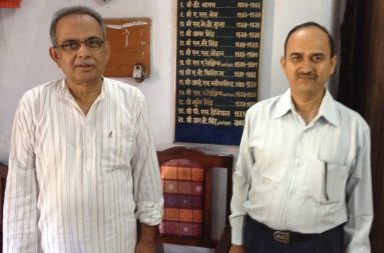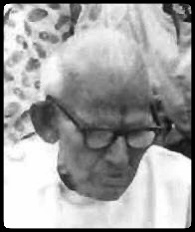I enjoy reading blogs and articles on Sarthaksamvad, a platform that features fascinating pieces, reflections, and insights into the thoughts and work of Guruji Ravindra Sharma.
Unveiling Guruji’s philosophy
The website’s tagline, “A space to gaze at the world from a Bharatiya perspective,” is particularly intriguing. For those unfamiliar with Guruji and his legacy, more information can be found on the site. I also contributed a blog on Vrikshamandir about my brief chance meeting with Guruji in Patna, which you can read here .
The driving force behind Sarthaksamvad is Shishir Gupta, the founder of Jeevika Ashram in the village of Indrana, Jabalpur. He studied at IRMA. His dedication to rural development and his efforts to preserve Guruji’s legacy are commendable.
Who knows, during my next trip to India, I might visit Jeevika Ashram and spend some time observing and learning from the incredible work being done by this institution.
A deep dive into colonial history: Lessons from “The White Sahibs in India”
The purpose of this blog is twofold: to share information about Guruji, Jeevika Ashram, and Shri Ashish Kumar Gupta, as well as to highlight one of the insightful blogs published on Sarthaksamvad.
You can access it by clicking on this link: Introducing a Must-Read Book: The White Sahibs in India by Pawan Gupta.
To give you a brief overview of the aforementioned book, here’s an excerpt from the blog:
“This book not only details the brutality of the British Raj but also delves into the workings of the British mind. For instance, it explains how India was acquired as an asset by the British Government from the East India Company, with this amount charged to the newly formed Government of India in 1858. Consequently, this debt was repaid by taxing the people of India, making India pay for itself and for the costs associated with the violence inflicted during the 1857 revolt. This manipulation of accounting is just one example of the British tendency to ‘justify’ their actions, whether moral or immoral. The book presents numerous instances of British thievery and cunning, illustrating how they not only plundered our resources but also made us bear the costs of our own exploitation.”
I found the 400 plus page book in the Internet archives. If you’re interested in accessing the 1937 publication, click on this link: THE WHITE SAHIBS IN INDIA.
If you wish to get this book in electronic form it is available for Rs 590 from Hindueshop.com
This is how the web page on Hindueshop.com describes this book.
“White Sahibs In India”
The White Sahibs In India’, a book written in 1937 by a sympathetic Englishman, Reginald Reynolds, is relentless in graphically exposing the dishonesty, the inhumanity, the brutality of the growth and maintenance of British rule in India. The book tells this disturbing story in clear, well-referenced terms; a story that has been carefully hidden away from us by our British-initiated, West-glorifying, India-bashing (subtly) education system.
₹650.00 Original price was: ₹650.00.₹590.00

This book has the prayer of the East India Company Servants.
“THE PRAYER OF THE EAST INDIA COMPNY SERVANTS
O Almighty and most Merciful God, who are the Sovereign Protector of all that Trust in Thee, and the Author of all Spiritual and Temporal Blessings * we thy unworthy Creatures do most humbly implore thy goodness for a plentiful Effusion of thy Grace upon our Employers, thy servants, the Right Honourable EAST INDIA Company of ENGLAND. Prosper them in all their publik undertakings * and make them famous and successful in all their Governments, Colonies, and Commerce both by Sea and Land; so that they may prove a publik Blessing by the increase of Honour, Wealth and Power to our native country * as well as to themselves , Continue their Favours towards us, inspire their Generals * Presidents *Agents *and Councils in these remote parts of the world, and all others that are entrusted with any Authority under them , with Piety towards Thee our God and with Wisdom , Fidelity and Circumspection in their several stations; That we may all discharge our respective Duties faithfully * and live Virtuously, in due Obedience to our superiors, and in Love, Peace and Charity one towards another: That these these Indian Nations among whom we dwell, seeing our sober and righteous Conversations, may be induced to have a just esteem for our most holy profession of the gospel of our Lord, and Saviour Jesus to whom be Honour, Praise and Glory, now and for ever. AMEN
[This prayer* used by Company’s servants is given as quoted by the Rev, John Ovington* some time Chaplin to the Company’s factory at Surat* in his book A voyage Suratt in the year 1689. ( Published in London 1696*) Three such prayers were in 1698 * approved by the Archbishop of Canterbury and the Lord Bishop of London]”
THE PRATER OF THE EAST INDIA COMP ANTS
SERVANTS
0 Almighty and most Merciful God , who art the Sovereign
Protector of all that Trust in Thee, and the Author of all Spiritual
and Temporal Blessings * we thy unworthy Creatures do most
humbly implore thy goodness for a plentiful Effusion of thy Grace
upon our Employers , thy Servants , the Right Honourable EAST
INDIA Company of ENGLAND . Prosper them in all their
publick Undertakings * and make them famous and successful in
all their Governments , Colonies , and Commerce both by Sea and
Land ; so that they may prove a publick Blessing by the increase
of Honour , Wealth and Power to our Native Country * as well as
to themselves . Continue their Favours towards us , inspire
their Generals * Presidents * Agents and Councils in these remote
parts of the World , and all others that are entrusted with any
Authority under them , with Piety towards Thee our God and with
Wisdom, Fidelity and Circumspection in their several Stations ;
That we may all discharge our respective Duties faithfully * and
live Virtuously, in due Obedience to our superiors, and in Love,
Peace and Charity one towards another: That these INDIAN
Nations among whom we dwell, seeing our sober and righteous
Conversation, may be induced to have a just esteem for our most
holy Profession of the Gospel of our Lord , and Saviour Jesus
Christ, to whom be Honour, Praise and Glory, now and for ever .
AMEN
[This prayer* used by the Company’s servants* is given
as quoted by the Rev, John Ovington* sometime chaplain
to the Company’s fhctory at Surat* in his book A Voyage
to Suratt in the Tear 1689. (Published in London* 1696*)
Three such prayers were in 1698 “approved by His Grace
the Archbishop of Canterbury and the Lord Bishop of
London.”]

Now compare it with the prayer for Ma Durga penned by Sri Aurobindo.
Thank you 🙏🏼



